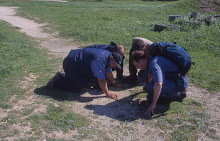mercoledì 25 novembre 2015
Islam, America, Russia and war
This war appears a war between Islam and the West, but is instead a war between America and Russia. Ant the fact that a war between the two main nuclear powers is impossible (hopefully at least), is the very reason why this war appears as a war between Islam and the Western Civiliaztion. I say America, but it would better to say between the group around McCain and the Russia. Mr Obama fiercely opposes the war.
domenica 22 novembre 2015
Evolution of the Indo-European languages, phentics, cladistics and the scientific method
This video about the evolution of Indo-European languages deserves to be listened. It criticizes a paper on Science, based on the method of clustering analysis, which tries to find the origin of IndoEuropean languages. Although the criticism it presents is 95% (I will come back on this later), I found it rather irritating. The reason of this irriation became clear to me at minute 45.50 where says that the research on science is close to the method of creationsim, since, instead of looking for the theory explaining the facts, it looks for the facts which support the theory. But this is not the method of creationsim, it is the hypothetica-deductive method of science. The method of creationists is "I believe in hypothesi A, let's find the facts that falsify the alternative hypothesis", and the latter is exactly the approach of the video.
Going into more detail, there are two approaches for the reconstruction of the tree of languages. The historical linguistic or traditional approaches compares in detaill single words of the languages, whereas the clustering method compares thousands of words at the same time. The two are obviously complementary, but the supporters of historical linguistics (like the authors of the video) never accepted the numerical methods. Some criticism is nonetheless founded. The two approaches exist also in taxonomy: the numerical method is called phenetic, since it looks for overall similarity, whereas the historical linguistic method is called cladistic, and in the latter method only shared similarities, not overall similarity are considered (Actually cladistic was invested in linguistic earlier than in taxonomy). At minute 24.30 the difference between the two approaches is discussed without the author being aware, obviously, of the existence of the same problems in taxonomy. In fact, if two languages (or two species) are compared on the base of overall similarity and not strictly on shared similarity, they appear more related than they are actually: the overall similarity of dolphins and fishes is large, but they are completely unrelated. Cladistic methods have never been applied in linguistics, to my knowledge, and it could be ftruiful to try.
Concerning the dating of the origin of languages the criticism of the video is that the dates of the tree contradict a few historical facts and that it does not consider movement of people like the latins conquering the Mediterranean. It is sensible, but useless, since the only way to estimated the origin of languages or cluster of languages for which there is no historical record is to assume constant rate of evolution. It is a pire aller, but nothing better exists.
Going into more detail, there are two approaches for the reconstruction of the tree of languages. The historical linguistic or traditional approaches compares in detaill single words of the languages, whereas the clustering method compares thousands of words at the same time. The two are obviously complementary, but the supporters of historical linguistics (like the authors of the video) never accepted the numerical methods. Some criticism is nonetheless founded. The two approaches exist also in taxonomy: the numerical method is called phenetic, since it looks for overall similarity, whereas the historical linguistic method is called cladistic, and in the latter method only shared similarities, not overall similarity are considered (Actually cladistic was invested in linguistic earlier than in taxonomy). At minute 24.30 the difference between the two approaches is discussed without the author being aware, obviously, of the existence of the same problems in taxonomy. In fact, if two languages (or two species) are compared on the base of overall similarity and not strictly on shared similarity, they appear more related than they are actually: the overall similarity of dolphins and fishes is large, but they are completely unrelated. Cladistic methods have never been applied in linguistics, to my knowledge, and it could be ftruiful to try.
Concerning the dating of the origin of languages the criticism of the video is that the dates of the tree contradict a few historical facts and that it does not consider movement of people like the latins conquering the Mediterranean. It is sensible, but useless, since the only way to estimated the origin of languages or cluster of languages for which there is no historical record is to assume constant rate of evolution. It is a pire aller, but nothing better exists.
sabato 21 novembre 2015
Costituzione, Corano, Renzi
Gramellini afferma che la Costituzione viene prima del Corano.
Forse occorrerebbe ricordare a Renzi che viene anche prima di Confindustria.
Forse occorrerebbe ricordare a Renzi che viene anche prima di Confindustria.
venerdì 6 novembre 2015
Muccino e Pasolini
Umberto Eco una volta disse che si può anche dire che Dante era un cattivo poeta, ma solo dopo 50 pagine di fitta analisi testuale. Il problema di Muccino che critica Pasolini perché non ha tecnica cinematografica non è tanto un mediocre che critica un gigante, quanto che non c'è argomentazione, come nelle chiacchere da bar. Tra l'altro, è abbastanza divertente che non si sia accorto che il carattere naif della tecnica cinematografica di Pasolini, assai evidente, rientra pienamente nello stile delle ricerca artistiche di avanguardia del secondo dopoguerra, che disprezzano la tecnica, da Duchamp al punk.
Etichette:
cinema,
contemporary art,
Pasolini
Iscriviti a:
Post (Atom)
